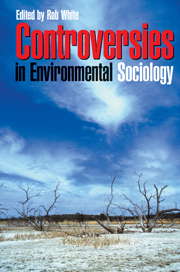Book contents
- Frontmatter
- Contents
- Tables and Figures
- Author Notes
- Abbreviations
- Introduction: Sociology, Society and the Environment
- PART I SOCIAL PERSPECTIVES
- PART II SOCIAL TRENDS
- 6 When the Population Clock Stops Ticking
- 7 Inequality, Social Differences and Environmental Resources
- 8 Sustainable Technology: Beyond Fix and Fixation
- 9 Think Global, Act Local
- 10 Citizenship and Sustainability
- 11 The Environment Movement
- PART III SOCIAL ISSUES
- Index
- References
10 - Citizenship and Sustainability
Rights and Responsibilities in the Global Age
Published online by Cambridge University Press: 05 June 2012
- Frontmatter
- Contents
- Tables and Figures
- Author Notes
- Abbreviations
- Introduction: Sociology, Society and the Environment
- PART I SOCIAL PERSPECTIVES
- PART II SOCIAL TRENDS
- 6 When the Population Clock Stops Ticking
- 7 Inequality, Social Differences and Environmental Resources
- 8 Sustainable Technology: Beyond Fix and Fixation
- 9 Think Global, Act Local
- 10 Citizenship and Sustainability
- 11 The Environment Movement
- PART III SOCIAL ISSUES
- Index
- References
Summary
As an object of academic and political concern, the concept of citizenship has received ever-increasing attention with enlargement of the political context from the nation-state to the globe over the last several decades. The Australian government, for example, commissioned a report into citizenship and civic education out of concern for rising political apathy (Civic Expert Group 1994). The volume of scholarly publications on the subject has accelerated since the 1980s. Such theorising occurs against a background of substantive change in political communities and political legitimacy effected by an upswing in globalising processes; structural crises in the world economic system; increasing global risks and uncertainties; growing inequalities among rich and poor both internationally and intranationally; environmental degradation and decline at both local and global scales; and greater ethnic diversity and multiculturalism in formerly homogeneous populations. All of these shifts portend increasing global interdependence and have considerable implications for how the various dimensions of citizenship are perceived but most particularly for the apparent rights and responsibilities adhering to citizenship.
In the context of such shifts, two discourses are uppermost in shaping the nature of citizenship. These are the discourses of globalisation and sustainability, both of which are contested. On the one hand, globalisation is characterised as ‘the beginning of a new epoch in human affairs’ (Held et al. 1999: 494) or as a transition from one state to another (Albrow 1996).
- Type
- Chapter
- Information
- Controversies in Environmental Sociology , pp. 168 - 184Publisher: Cambridge University PressPrint publication year: 2004
References
- 5
- Cited by



